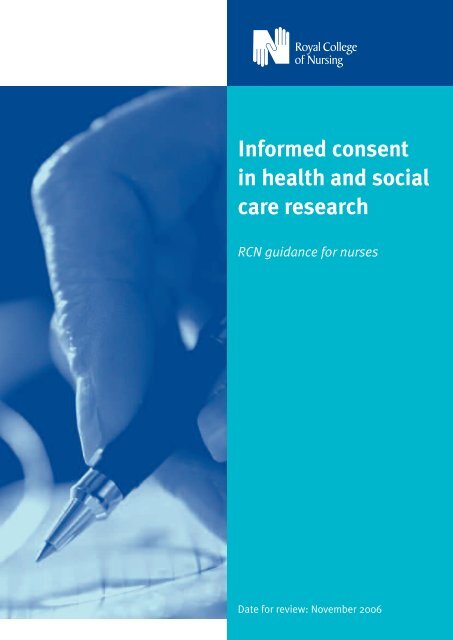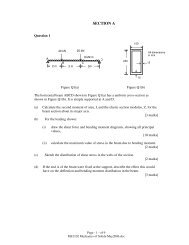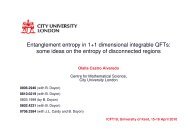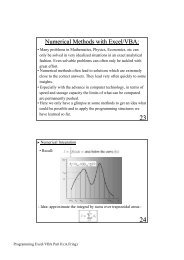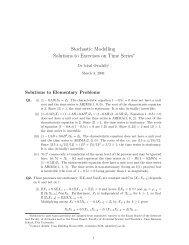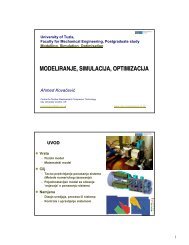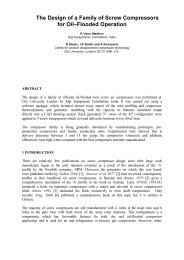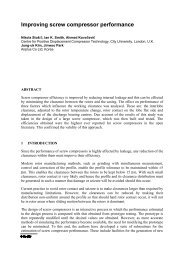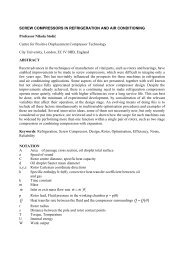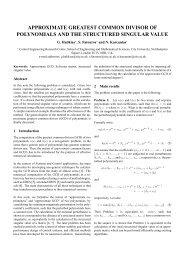Informed consent - Health informatics It and research
Informed consent - Health informatics It and research
Informed consent - Health informatics It and research
You also want an ePaper? Increase the reach of your titles
YUMPU automatically turns print PDFs into web optimized ePapers that Google loves.
R OYAL COLLEGE OF NURSING<br />
<strong>Informed</strong> <strong>consent</strong><br />
in health <strong>and</strong> social<br />
care <strong>research</strong><br />
RCN guidance for nurses<br />
Date for review: November 2006
Contributors<br />
The RCN Research Society would like to thank all those who contributed to<br />
the preparation of this document.<br />
Contributing authors<br />
Helen Caulfield<br />
Jan Dewing<br />
Gavin Fairbairn<br />
Linda S Franck<br />
Leslie Gelling<br />
June Jones<br />
Joyce Kenkre (Chair)<br />
Elizabeth King<br />
Maggie Kirk<br />
Sian Maslin-Prothero<br />
Ann McMahon<br />
Gill Pearce<br />
Linda Pur<strong>and</strong>are<br />
John Richardson<br />
Win Tadd<br />
Tom Tait<br />
Annie Young<br />
Reviewers<br />
Janet Ball<br />
Michele Ball<br />
Dot Chatfield<br />
Caroline Crockatt<br />
Carol Dealey<br />
Angus Donald<br />
Kate Gerrish<br />
Martin Johnson<br />
Jane Lamprill<br />
Tony Long<br />
Kim Manley<br />
Christine McGrath<br />
Hugh McKenna<br />
Dave O’Carroll<br />
Jenny Ritchie<br />
Graeme Scott<br />
Charles Shepherd<br />
Lorraine Smith<br />
Dave Talbot<br />
Valerie White<br />
Jan Woolford<br />
Pauline Wright<br />
Indemnity insurance<br />
<strong>It</strong> is important that all nurses (<strong>and</strong> other health professionals) have insurance<br />
cover for their practice, including <strong>research</strong> activities. RCN membership<br />
includes this indemnity insurance cover. Members should contact RCN Direct<br />
on 0845 772 6100 if they have queries or visit www.rcn.org.uk/faqs<br />
RCN Legal Disclaimer<br />
This publication contains information, advice <strong>and</strong> guidance to help members of the RCN. <strong>It</strong> is intended for use within the UK but readers are advised<br />
that practices may vary in each country <strong>and</strong> outside the UK.<br />
The information in this booklet has been compiled from professional sources, but its accuracy is not guaranteed. Whilst every effort has been made to<br />
ensure the RCN provides accurate <strong>and</strong> expert information <strong>and</strong> guidance, it is impossible to predict all the circumstances in which it may be used.<br />
Accordingly, the RCN shall not be liable to any person or entity with respect to any loss or damage caused or alleged to be caused directly or indirectly<br />
by what is contained in or left out of this website information <strong>and</strong> guidance.<br />
Published by the Royal College of Nursing, 20 Cavendish Square, London, W1G 0RN<br />
© 2005 Royal College of Nursing. All rights reserved. No part of this publication may be reproduced, stored in a retrieval system, or transmitted in any<br />
form or by any means electronic, mechanical, photocopying, recording or otherwise, without prior permission of the Publishers or a licence permitting<br />
restricted copying issued by the Copyright Licensing Agency, 90 Tottenham Court Road, London W1T 4LP. This publication may not be lent, resold,<br />
hired out or otherwise disposed of by ways of trade in any form of binding or cover other than that in which it is published, without the prior <strong>consent</strong><br />
of the Publishers.
ROYAL COLLEGE OF NURSING<br />
<strong>Informed</strong> <strong>consent</strong> in health<br />
<strong>and</strong> social care <strong>research</strong><br />
RCN guidance for nurses<br />
Contents<br />
1. Introduction 2<br />
2. What is informed <strong>consent</strong>? 3<br />
3. <strong>Informed</strong> <strong>consent</strong> in special circumstances 4<br />
4. The ethical <strong>and</strong> legal framework 6<br />
5. Individual responsibilities 8<br />
6. The participant’s perspective 9<br />
7. The process of gaining informed <strong>consent</strong> 10<br />
8. Vulnerable people 11<br />
9. Human tissue samples 14<br />
10. Conclusion 15<br />
11. References 16<br />
1
INFORMED CONSENT IN HEALTH AND SOCIAL CARE RESEARCH<br />
1<br />
Introduction<br />
The purpose of <strong>research</strong> is to gain<br />
knowledge <strong>and</strong> underst<strong>and</strong>ing<br />
through original investigation.<br />
(Higher Education Funding Council for Engl<strong>and</strong>, 2005, p.23)<br />
Nurses are taking an increasingly active role in<br />
<strong>research</strong> in order to develop new knowledge <strong>and</strong> to<br />
create a larger evidence base to inform their<br />
practice. This involves them in developing<br />
protocols, leading investigations <strong>and</strong> collaborating<br />
with colleagues from other disciplines <strong>and</strong><br />
institutions.<br />
When they are engaged in <strong>research</strong> involving<br />
human participants, nurses have a responsibility to<br />
ensure that the interests of those participants,<br />
whether patients or healthy volunteers, are<br />
protected. This applies to all <strong>research</strong>, even when<br />
the study is not specifically related to nursing<br />
practice, such as trials of new medicines or<br />
treatments.<br />
Gaining informed <strong>consent</strong> from <strong>research</strong><br />
participants, where this is possible, is a vital part of<br />
the <strong>research</strong> process. When you are involved as a<br />
nurse in any <strong>research</strong> activity, you need to<br />
underst<strong>and</strong> the concept <strong>and</strong> importance of<br />
informed <strong>consent</strong> <strong>and</strong> how it is gained.<br />
The Royal College of Nursing (RCN) Research<br />
Society has developed this guidance for nurses<br />
involved in <strong>research</strong> at any level. <strong>It</strong> discusses:<br />
✦ the concept of informed <strong>consent</strong><br />
✦ informed <strong>consent</strong> in special circumstances<br />
✦ the ethical <strong>and</strong> legal framework<br />
✦ responsibilities in obtaining informed <strong>consent</strong><br />
✦ the participant’s perspective<br />
✦ the process of gaining informed <strong>consent</strong><br />
✦ working with vulnerable groups<br />
✦ human tissue samples.<br />
A bibliography of useful reading on the subject of<br />
informed <strong>consent</strong>, further sources consulted in<br />
developing this document, <strong>and</strong> other sources of<br />
relevant information are available on the RCN<br />
Research Society’s website<br />
www.man.ac.uk/rcn/informed<strong>consent</strong><br />
Another RCN document, Research ethics: RCN<br />
guidance for nurses (2004), discusses the ethical<br />
principles underpinning <strong>research</strong> in general.<br />
2
ROYAL COLLEGE OF NURSING<br />
2<br />
What is informed<br />
<strong>consent</strong>?<br />
<strong>Informed</strong> <strong>consent</strong> is an ongoing agreement<br />
by a person to receive treatment, undergo<br />
procedures or participate in <strong>research</strong>, after<br />
risks, benefits <strong>and</strong> alternatives have been<br />
adequately explained to them.<br />
This section discusses the concept of informed<br />
<strong>consent</strong> <strong>and</strong> the information potential participants<br />
need to receive <strong>and</strong> underst<strong>and</strong> in order to give<br />
informed <strong>consent</strong>.<br />
Freely given informed <strong>consent</strong> is central to <strong>research</strong><br />
involving human participants or the use of human<br />
tissues or genetic material. This is because it is<br />
essential to ensure that those who participate in<br />
<strong>research</strong> underst<strong>and</strong> exactly what the <strong>research</strong><br />
involves for them. This applies equally whether<br />
they are patients or healthy volunteers. <strong>Informed</strong><br />
<strong>consent</strong> helps to ensure that people are not<br />
deceived or coerced into participating in <strong>research</strong>.<br />
In order to give truly informed <strong>consent</strong>, potential<br />
participants need to underst<strong>and</strong> the following:<br />
✦ the purpose of the <strong>research</strong><br />
✦ the practicalities <strong>and</strong> procedures involved in<br />
participating<br />
✦ the benefits <strong>and</strong> risks of participation <strong>and</strong>, if<br />
appropriate, the alternative therapies<br />
✦ how data about them will be managed <strong>and</strong> used<br />
✦ the <strong>consent</strong> form<br />
✦ their role if they agree to participate in the<br />
<strong>research</strong><br />
✦ how information will be provided to them<br />
throughout the study<br />
✦ that their participation is voluntary<br />
✦ that they can withdraw from the study at any<br />
time, without giving any reason <strong>and</strong> without<br />
compromising their future treatment<br />
✦ the insurance indemnity arrangements for the<br />
conduct of the <strong>research</strong> where appropriate<br />
✦ that the <strong>research</strong> has been approved by a<br />
<strong>research</strong> ethics committee.<br />
They should also be given the following<br />
information:<br />
✦ contact details, should they have further<br />
questions or wish to withdraw<br />
✦ details of the <strong>research</strong> sponsor <strong>and</strong> <strong>research</strong><br />
funding body.<br />
Continued <strong>consent</strong><br />
<strong>Informed</strong> <strong>consent</strong> is an ongoing requirement, so<br />
<strong>research</strong>ers must ensure that participants:<br />
✦ continue to underst<strong>and</strong> the information above<br />
<strong>and</strong> any changes in that information<br />
✦ continue to <strong>consent</strong> to participate throughout<br />
the study.<br />
3
INFORMED CONSENT IN HEALTH AND SOCIAL CARE RESEARCH<br />
3<br />
<strong>Informed</strong> <strong>consent</strong> in<br />
special circumstances<br />
The principles of informed <strong>consent</strong> <strong>and</strong> the process<br />
of acquiring it are the same for all potential<br />
participants, except in special circumstances.<br />
Sometimes it is not possible to obtain participants’<br />
<strong>consent</strong> before <strong>research</strong> activity begins. This should<br />
not prevent important <strong>research</strong> from being<br />
undertaken, but <strong>research</strong>ers must take great care to<br />
protect the interests of participants <strong>and</strong> to consult<br />
other appropriate people about an individual’s<br />
participation. This section discusses informed<br />
<strong>consent</strong> in special circumstances where usual<br />
practices may be difficult to apply.<br />
Delayed <strong>consent</strong><br />
Delayed <strong>consent</strong> usually occurs in emergency<br />
situations, when obtaining informed <strong>consent</strong> might<br />
make the study impossible. For example, it may be<br />
needed for <strong>research</strong> undertaken:<br />
✦ at the roadside in the event of an accident<br />
✦ at a cardiac arrest<br />
✦ during the early stages of a patient’s emergency<br />
admission to an accident <strong>and</strong> emergency<br />
department,<br />
The Mental Capacity Act 2005, to be implemented<br />
in 2007, states that urgent or emergency <strong>research</strong><br />
can be undertaken if ‘it is not reasonably practical’<br />
to meet the requirements for informed <strong>consent</strong><br />
from a potential participant who lacks the capacity<br />
to <strong>consent</strong> for themselves. The <strong>research</strong> team will<br />
be expected to demonstrate to an ethics committee<br />
that this <strong>research</strong> is necessary <strong>and</strong> could not have<br />
been undertaken in a population where<br />
participants were able to provide informed <strong>consent</strong><br />
in advance. In each instance, the <strong>research</strong> team<br />
should seek informed <strong>consent</strong> as soon as possible<br />
from the participant.<br />
Implied <strong>consent</strong><br />
A straightforward example of when a participant<br />
implies their <strong>consent</strong> is when they return a<br />
completed anonymous questionnaire. In other<br />
situations, potential participants with severe<br />
disabilities or multiple injuries may be unable to<br />
communicate their <strong>consent</strong> verbally or in writing.<br />
In these cases, <strong>research</strong>ers can gain implied<br />
<strong>consent</strong>, in which a person indicates <strong>consent</strong> by<br />
their actions after they have received information<br />
about the study. In such circumstances a protocol<br />
should require that a witness is present who also<br />
signs the <strong>consent</strong> form. A <strong>research</strong>er or a witness<br />
can infer that a patient has given implied <strong>consent</strong><br />
when each of these criteria are met:<br />
✦ the patient can reasonably be expected to be<br />
aware of the sharing of their data <strong>and</strong> to<br />
underst<strong>and</strong> the need for it to be shared<br />
✦ the benefits to the patient or the public<br />
outweigh the risks to the patient<br />
✦ the patient is offered a clear procedure for<br />
withholding <strong>consent</strong>, but does not do so.<br />
Best interests<br />
In Engl<strong>and</strong>, Northern Irel<strong>and</strong> <strong>and</strong> Wales currently<br />
(before The Mental Capacity Act 2005 is<br />
implemented in 2007), nobody can legally give<br />
<strong>consent</strong> for another adult for treatment or for<br />
participation in a <strong>research</strong> study (Department of<br />
<strong>Health</strong>, 2001). If a person is unable to <strong>consent</strong>,<br />
treatment can be given without their <strong>consent</strong><br />
providing the intervention is considered in the ‘best<br />
interests’ of the individual. The individual’s own<br />
wishes <strong>and</strong> values should be taken into account if<br />
known – for example, through an advance<br />
statement/directive.<br />
In Scotl<strong>and</strong>, the Adults with Incapacity Act 2000<br />
permits another person to provide informed<br />
<strong>consent</strong> on behalf of an incapacitated adult for<br />
treatment or for participation in a <strong>research</strong> study.<br />
In 2007 when The Mental Capacity Act 2005 has<br />
been implemented, this will also be the case in<br />
Engl<strong>and</strong> <strong>and</strong> Wales.<br />
4
ROYAL<br />
COLLEGE OF NURSING<br />
Consent by proxy<br />
In cases where potential participants are unable to<br />
<strong>consent</strong> for themselves, it has been common<br />
practice for another appropriate person to be asked<br />
to give ‘proxy <strong>consent</strong>’,however,as noted,this has<br />
no legal st<strong>and</strong>ing outside Scotl<strong>and</strong>. Traditionally,<br />
<strong>research</strong>ers have relied on proxy <strong>consent</strong> when the<br />
potential <strong>research</strong> subject is deemed not to be<br />
legally competent. This can apply to a number of<br />
groups including:<br />
✦ children<br />
✦ people with dementia or other cognitive<br />
impairment<br />
✦ people with learning disabilities<br />
✦ people with mental illnesses.<br />
In these situations, <strong>research</strong>ers must assess a<br />
potential participant’s level of competence to make<br />
decisions, <strong>and</strong> assure themselves that it is<br />
appropriate to obtain proxy <strong>consent</strong> <strong>and</strong> not<br />
directly from the participant. Researchers will also<br />
be required to demonstrate this to their <strong>research</strong><br />
ethics committee.<br />
A family member, next of kin or carer most often<br />
provides proxy <strong>consent</strong>. <strong>It</strong> is sometimes given by a<br />
professional carer such as a nursing or medical<br />
professional who is not involved in the <strong>research</strong><br />
study. A recognised advocate can also give <strong>consent</strong>.<br />
Researchers must ensure that the individual<br />
providing <strong>consent</strong> is able to give informed proxy<br />
<strong>consent</strong>. This means they must be given <strong>and</strong><br />
underst<strong>and</strong> all the information which would<br />
normally be given to potential participants<br />
themselves. Researchers should consider whether<br />
the person giving proxy <strong>consent</strong> is acting in the<br />
best interests of the potential participant <strong>and</strong>,<br />
where appropriate, does so with due regard either<br />
to the participant’s last known wishes or to their<br />
lifelong value system.<br />
5
INFORMED CONSENT IN HEALTH AND SOCIAL CARE RESEARCH<br />
4<br />
The ethical <strong>and</strong><br />
legal framework<br />
<strong>Informed</strong> <strong>consent</strong> is bound by ethical <strong>and</strong> legal<br />
frameworks, <strong>and</strong> the processes for gaining it must<br />
be independently scrutinised <strong>and</strong> approved.<br />
This section discusses the ethical <strong>and</strong> legal<br />
requirements regarding informed <strong>consent</strong>, <strong>and</strong> the<br />
bodies responsible for ensuring that the processes<br />
for gaining <strong>consent</strong> are adequate.<br />
The ethical framework<br />
<strong>Informed</strong> <strong>consent</strong> is at the heart of ethical <strong>research</strong>,<br />
<strong>and</strong> the national <strong>research</strong> governance frameworks<br />
state that <strong>research</strong>ers must make appropriate<br />
arrangements to obtain informed <strong>consent</strong> from<br />
their participants (DH, 2005).<br />
The core ethical principle in <strong>research</strong> is respect for<br />
every individual (RCN, 2004). Researchers must<br />
therefore respect diversity when gaining informed<br />
<strong>consent</strong> (DH, 2001 & 2005; Scottish Executive<br />
<strong>Health</strong> Department, 2001; Wales Office of Research<br />
<strong>and</strong> Development, 2001; DHSSPSNI, 2002).<br />
Researchers must take into account factors such as:<br />
✦ ethnicity<br />
✦ gender<br />
✦ disability<br />
✦ religious beliefs<br />
✦ culture<br />
✦ language<br />
✦ level of underst<strong>and</strong>ing.<br />
Since <strong>research</strong>ers cannot know how any or all of<br />
these factors might affect a potential participant,<br />
they must be sensitive when going through the<br />
process of gaining <strong>consent</strong>.<br />
The legal framework<br />
Gaining informed <strong>consent</strong> in <strong>research</strong> which<br />
involves invasive procedures is considered to be a<br />
legal requirement. If a <strong>research</strong> activity proceeds<br />
without an individual’s informed <strong>consent</strong> legal<br />
action could be taken against the chief investigator<br />
or <strong>research</strong>er for battery.<br />
Case law on <strong>consent</strong> in the UK has established three<br />
requirements to be satisfied before a potential<br />
<strong>research</strong> participant can give informed <strong>consent</strong>:<br />
✦ the <strong>consent</strong> should be given by someone with<br />
the mental ability to do so<br />
✦ sufficient information should be given to <strong>and</strong><br />
understood by the participant<br />
✦ the <strong>consent</strong> must be freely given.<br />
The first principle of data protection (Data<br />
Protection Act, 1998) is that information must be<br />
used fairly <strong>and</strong> lawfully. <strong>It</strong> is legally established that<br />
personal information should not be used for<br />
<strong>research</strong> without the explicit <strong>consent</strong> of the<br />
individual. This means they must have been asked<br />
specifically for their permission to disclose the<br />
information, been given an explanation of how the<br />
information will be used, <strong>and</strong> have given their<br />
permission in writing for the information to be<br />
used. The exception to this rule occurs in situations<br />
which are deemed by the State to be in the interest<br />
of patients <strong>and</strong> the wider public good.<br />
6
ROYAL<br />
COLLEGE OF NURSING<br />
Independent scrutiny<br />
All <strong>research</strong> proposals should be subject to<br />
independent scrutiny to ensure they are ethically<br />
acceptable. The application for ethical approval will<br />
include details of the proposed processes for<br />
gaining informed <strong>consent</strong>. Research teams may<br />
seek ethical approval from a number of relevant<br />
bodies, including:<br />
✦ university <strong>and</strong> NHS <strong>research</strong> ethics committees<br />
– many institutions have their own committees<br />
to consider the ethical implications of <strong>research</strong><br />
proposals<br />
✦ local <strong>research</strong> ethics committee (LREC) –<br />
<strong>research</strong> involving human participants requires<br />
approval from an LREC, normally established<br />
by the ‘health authority’ in the area where the<br />
<strong>research</strong> will be undertaken<br />
✦ multi-centre <strong>research</strong> ethics committees<br />
(MREC) – if <strong>research</strong> is to be undertaken in<br />
more than one site, <strong>research</strong>ers need ethical<br />
approval from a MREC. In most instances, sitespecific<br />
approval will also be required in each<br />
<strong>research</strong> location<br />
✦ Gene Therapy Advisory Committee (GTAC) –<br />
all proposals to conduct gene therapy <strong>research</strong><br />
must be approved by the GTAC as well as from<br />
an LREC or MREC.<br />
7
INFORMED CONSENT IN HEALTH AND SOCIAL CARE RESEARCH<br />
5<br />
Individual<br />
responsibilities<br />
This section examines the responsibilities of<br />
different practitioners <strong>and</strong> groups in the process of<br />
seeking informed <strong>consent</strong>.<br />
Nurses<br />
Even when you are not leading <strong>research</strong> studies, as<br />
a nurse you may often be involved in delivering the<br />
intervention concerned. The NMC code of<br />
professional conduct states that you are accountable<br />
for your own practice (NMC, 2004). Whatever the<br />
level of your involvement, you must be satisfied<br />
that participants have given informed <strong>consent</strong> to<br />
take part in the <strong>research</strong> study before you act.<br />
Lead <strong>research</strong>er<br />
Overall responsibility for all elements of <strong>research</strong><br />
activity, including gaining informed <strong>consent</strong>, rests<br />
with the lead <strong>research</strong>er, although each individual<br />
member of the <strong>research</strong> team is responsible for<br />
their own specific actions. If you are the lead<br />
<strong>research</strong>er you may delegate the task of obtaining<br />
informed <strong>consent</strong> to another appropriately<br />
qualified member of the <strong>research</strong> team, but this<br />
delegation must be clearly documented, <strong>and</strong> the<br />
person gaining informed <strong>consent</strong> must sign the<br />
<strong>consent</strong> form when required. To sign a <strong>consent</strong><br />
form when you have not personally been involved<br />
is fraudulent.<br />
Sponsors <strong>and</strong> funding bodies<br />
The sponsor <strong>and</strong> funding body of a <strong>research</strong> study<br />
are often the same entity (such as a pharmaceutical<br />
company). However, they have slightly different<br />
roles:<br />
✦ the funding body provides financial support<br />
through contracts with the <strong>research</strong>ers <strong>and</strong>/or<br />
their institutions<br />
✦ the sponsor has primary responsibility for<br />
ensuring that the design, conduct <strong>and</strong> reporting<br />
of the study meet appropriate st<strong>and</strong>ards.<br />
Both will have a view on how informed <strong>consent</strong> is<br />
gained. For example, some protocols specify the<br />
qualifications of the person required to obtain<br />
<strong>consent</strong>.<br />
Research participants<br />
Potential participants should underst<strong>and</strong> that if<br />
they agree to take part in <strong>research</strong> they have a duty<br />
to the <strong>research</strong>ers. In giving informed <strong>consent</strong> they<br />
are agreeing to comply with the requirements of the<br />
<strong>research</strong>. If at any time they are unable or unwilling<br />
to do this they should consider withdrawing from<br />
the <strong>research</strong>. <strong>It</strong> is important to emphasise that<br />
withdrawal from a clinical study will not<br />
compromise the quality of care they receive,<br />
although their treatment may change. For example,<br />
if the study is examining a new treatment, they may<br />
go back to receiving st<strong>and</strong>ard treatment.<br />
8
ROYAL<br />
COLLEGE OF NURSING<br />
6<br />
The participant’s<br />
perspective<br />
Deciding whether or not to take part in a <strong>research</strong><br />
project involves considering a number of factors<br />
including personal <strong>and</strong> financial costs. Some<br />
<strong>research</strong> projects provide travel expenses to attend<br />
appointments, child care costs <strong>and</strong> remuneration<br />
for time off work. This section examines how the<br />
benefits involved, or health professionals’ views,<br />
may influence an individual’s decision to<br />
participate in <strong>research</strong>.<br />
Benefits<br />
Participating in <strong>research</strong> can have a number of<br />
perceived benefits for patients including:<br />
✦ access to experimental treatments that might<br />
give better outcomes than st<strong>and</strong>ard treatments<br />
✦ closer monitoring<br />
✦ increased access to members of the<br />
multidisciplinary team<br />
✦ extra investigations<br />
✦ the satisfaction of benefiting future patients.<br />
These incentives may be available to both patients<br />
<strong>and</strong> healthy volunteers. However, volunteers may<br />
also receive payment for participating.<br />
Potential participants should be informed of the<br />
possible benefits of taking part. However,<br />
<strong>research</strong>ers must take care that these benefits,<br />
particularly the financial ones, do not lead<br />
individuals to be persuaded to participate in<br />
<strong>research</strong> for the wrong reasons. If the proposed<br />
study is a r<strong>and</strong>omised controlled trial, it should be<br />
made clear that potential participants might not<br />
receive the experimental treatment or an<br />
intervention but may receive st<strong>and</strong>ard care or a<br />
placebo.<br />
Professionals’ views<br />
When discussing a <strong>research</strong> study with potential<br />
participants, it is important that you as a <strong>research</strong>er<br />
do not allow your personal views to influence<br />
whether or not an individual <strong>consent</strong>s to take part.<br />
You must give them adequate information <strong>and</strong> then<br />
allow them to decide for themselves.<br />
You should answer any questions potential<br />
participants may have, or ask a colleague to do so if<br />
you do not know the answer. If the patient wants<br />
someone to help them make their decision,<br />
recommend they discuss it with a relative or friend<br />
– or a health care professional who is not involved<br />
in the <strong>research</strong> – as they may be better able to give<br />
an objective view. However, you should emphasise<br />
that ultimately, potential participants should only<br />
<strong>consent</strong> to participate if they are certain that they<br />
wish to.<br />
9
INFORMED CONSENT IN HEALTH AND SOCIAL CARE RESEARCH<br />
7<br />
The process of<br />
gaining informed<br />
<strong>consent</strong><br />
This section looks at factors you need to consider<br />
when going through the process of gaining<br />
informed <strong>consent</strong>.<br />
The discussion<br />
<strong>It</strong> is important to make potential participants as<br />
comfortable as possible about discussing the<br />
<strong>research</strong>, so that they are able to concentrate <strong>and</strong><br />
feel confident to ask questions.You should plan<br />
ahead to meet in relaxed surroundings, where there<br />
will be no interruptions, <strong>and</strong> to allow the potential<br />
participant to have a relative or close friend present<br />
if they wish to do so. While giving the information<br />
you can ensure they are able to give informed<br />
<strong>consent</strong> by:<br />
✦ repeating, explaining <strong>and</strong> reinforcing information<br />
✦ asking questions to check their underst<strong>and</strong>ing<br />
of the information.<br />
You should also think about the timing of the<br />
discussion. For example, patients who may have<br />
just been given news of a life-threatening illness are<br />
unlikely to be able to make an informed decision<br />
about participating in a <strong>research</strong> project when still<br />
struggling to come to terms with their situation.<br />
Acknowledging diversity<br />
<strong>It</strong> is important to acknowledge diversity when gaining<br />
informed <strong>consent</strong>, including factors such as a potential<br />
participant’s ethnicity, gender, sexuality, disability,<br />
religious or cultural beliefs <strong>and</strong> language.You<br />
cannot be expected to know how these might affect<br />
individuals, <strong>and</strong> should not make assumptions<br />
based on stereotypes. Asking questions can help<br />
you to underst<strong>and</strong> what might influence potential<br />
participants, so that you can deal with these issues<br />
sensitively.<br />
Reinforcing the discussion<br />
<strong>It</strong> is not enough to give potential participants a<br />
verbal explanation of the <strong>research</strong> project <strong>and</strong> what<br />
their involvement would entail.You should also give<br />
them further information, such as a written<br />
information sheet to take away, to help them to<br />
make their decision. Researchers may also be able<br />
to direct potential <strong>research</strong> participants to other<br />
sources of information, including books <strong>and</strong><br />
websites.You may need to prepare materials in<br />
various formats, depending on the particular needs<br />
of the potential participants (see section eight on<br />
Vulnerable People). For example, information for<br />
people with a visual impairment should be written<br />
in large, clear print. Alternatives to written<br />
information can include audiotape, videotape <strong>and</strong><br />
pictures as an aid for discussion on the proposed<br />
<strong>research</strong>. Materials used should explain the main<br />
points of the <strong>research</strong> to remind potential<br />
participants of your discussion, <strong>and</strong> act as a point<br />
of reference when they discuss participation with<br />
their family <strong>and</strong> others.<br />
The <strong>consent</strong> form<br />
The signing of a form has become st<strong>and</strong>ard practice<br />
in confirming that an individual has freely given their<br />
informed <strong>consent</strong> to participate in a <strong>research</strong> study.<br />
However, while a signed <strong>consent</strong> form provides good<br />
evidence that a discussion has taken place, it does not<br />
prove that <strong>consent</strong> is truly informed.<br />
Potential participants should not be asked to sign<br />
the <strong>consent</strong> form until they have been given full<br />
information about the study <strong>and</strong> have had time to<br />
consider their decision. When you ask for their<br />
decision, you must explain verbally all aspects of<br />
the study again <strong>and</strong> check their underst<strong>and</strong>ing. In<br />
certain circumstances, a protocol may require that<br />
a witness is present who also signs the <strong>consent</strong><br />
form, for example where a potential participant can<br />
neither read nor write.<br />
10
ROYAL<br />
COLLEGE OF NURSING<br />
8<br />
Vulnerable people<br />
This section discusses the special needs of<br />
individuals <strong>and</strong> groups who may be considered<br />
vulnerable <strong>and</strong> the factors to take into account<br />
when gaining informed <strong>consent</strong> for their<br />
participation in <strong>research</strong>.<br />
“Every recipient of health care is in some way<br />
vulnerable, but those with more limited<br />
ability to act autonomously can also be more<br />
vulnerable to the impact of <strong>research</strong> activity”<br />
(RCN, 2004)<br />
Assessing potential participants’ capacity to give<br />
their informed <strong>consent</strong> autonomously is an<br />
essential part of the informed <strong>consent</strong> process.<br />
Recognising special needs<br />
People can have a range of special needs that you<br />
need to take into account, <strong>and</strong> these are not always<br />
obvious, or may be concealed by some people. For<br />
example, someone with reading or writing<br />
difficulties may conceal this because they are<br />
embarrassed (‘I’ve forgotten my glasses, I’ll read it<br />
later’). Others may have visual or hearing<br />
impairments, illness or emotional difficulties. <strong>It</strong> is<br />
vital to explore your potential participant’s abilities<br />
sensitively.<br />
Where the <strong>research</strong>er <strong>and</strong> the potential participants<br />
do not speak the same language or their comm<strong>and</strong><br />
of the same language is not good enough to enable<br />
effective communication, written information<br />
should be translated into the first language of the<br />
participant. To be sure that the participant freely<br />
gives <strong>consent</strong> on the basis of proper underst<strong>and</strong>ing,<br />
a professional interpreter (rather than family<br />
members or friends) should be available for your<br />
discussions with them.<br />
Older people are more likely to suffer from sensory<br />
deficits, so you should check they are able to read<br />
written information <strong>and</strong> hear verbal information.<br />
The ability to process information can slow with<br />
age, so older people should be given plenty of time<br />
<strong>and</strong> opportunity to ask questions <strong>and</strong> think about<br />
whether to participate.<br />
Capacity to decide<br />
People can only give <strong>consent</strong> if they are capable of<br />
choosing between alternative courses of action.<br />
This means they must be able to underst<strong>and</strong> the<br />
information given by <strong>research</strong>ers.<br />
Including participants who have impaired capacity to<br />
decide in a study is more acceptable where <strong>research</strong> is<br />
necessary to promote the health of that particular<br />
group, <strong>and</strong> cannot be performed on legally competent<br />
people instead (for example, in testing drug dosages<br />
for children or interventions for Alzheimer’s disease).<br />
Researchers must be particularly sensitive to<br />
participants’ needs <strong>and</strong> vulnerabilities.<br />
Children <strong>and</strong> young people<br />
Children <strong>and</strong> their parents or guardians should be<br />
involved in the <strong>research</strong> <strong>consent</strong> process in<br />
proportion to the child or young person’s<br />
competence to weigh the risks <strong>and</strong> benefits.<br />
Children may need extra time to process<br />
information. If the child’s parent or guardian is<br />
giving <strong>consent</strong>, the child must also indicate that<br />
they do not object to the <strong>research</strong> activity. Children<br />
can give <strong>consent</strong> to participate in <strong>research</strong><br />
themselves provided they are ‘Gillick competent’.<br />
This means they are able to underst<strong>and</strong> the nature<br />
<strong>and</strong> consequences of their participation in the<br />
<strong>research</strong>. Gaining a child’s views <strong>and</strong> desires can<br />
require you to use of creative ways of providing<br />
information <strong>and</strong> alternative means for them to<br />
express their thoughts.<br />
Young people aged 16 years <strong>and</strong> older are generally<br />
capable of giving their own <strong>consent</strong>, while many<br />
who are under 16 are also able to give informed<br />
<strong>consent</strong>, or be involved in the decision making<br />
process.You will need to assess the individual<br />
child’s capacity, depending on their maturity <strong>and</strong><br />
underst<strong>and</strong>ing.<br />
11
INFORMED CONSENT IN HEALTH AND SOCIAL CARE RESEARCH<br />
Children are not allowed to receive monetary rewards<br />
for participation in <strong>research</strong>, although you can give<br />
non-monetary gifts such as toys, providing their<br />
value is not excessive.Any inducements to<br />
participation offered should benefit the child, not the<br />
parents (although items like travel costs are allowed).<br />
The Nursing <strong>and</strong> Midwifery Council (2002) states<br />
that:‘if the child is under 16 in Engl<strong>and</strong> <strong>and</strong> Wales,<br />
12 in Scotl<strong>and</strong> <strong>and</strong> 17 in Northern Irel<strong>and</strong>, you<br />
must be aware of legislation <strong>and</strong> local protocols<br />
relating to <strong>consent</strong>’. This is set out in the Children<br />
Act 1989 <strong>and</strong> in section 2(4) of the Age of Legal<br />
Capacity (Scotl<strong>and</strong>) Act 1991.<br />
Long-term care residents<br />
Older people <strong>and</strong> others living in long-term care<br />
facilities may find it more difficult to refuse to<br />
participate in a <strong>research</strong> study if approached by<br />
staff involved in their day-to-day care, because they<br />
don’t want to disappoint their carers. If your<br />
<strong>research</strong> involves such a population, you must take<br />
particular care that potential participants do not<br />
feel pressured or coerced into taking part.<br />
People with learning<br />
disabilities<br />
People with a learning disability must be given the<br />
same respect as anyone else <strong>and</strong> be protected from<br />
harm if they take part in <strong>research</strong>. Some may not be<br />
able to exercise fully their right to self-determination<br />
but they should be offered choices within their<br />
capabilities. These potential participants can choose<br />
or refuse to participate.<br />
Take care in evaluating each individual’s<br />
comprehension; use plain language, supported if<br />
necessary by other material such as pictures. If a<br />
potential participant cannot reasonably underst<strong>and</strong><br />
the nature of <strong>research</strong>, your emphasis should be less<br />
on information <strong>and</strong> more on evidence that they<br />
<strong>consent</strong> to participate, <strong>and</strong> on weighing up potential<br />
risks <strong>and</strong> benefits.You may need to involve a range<br />
of people who underst<strong>and</strong> the individual’s situation<br />
<strong>and</strong> can act in their best interests.<br />
Unresponsive patients<br />
Unresponsive patients, as a result of injuries or<br />
sedation, can only be included in <strong>research</strong> for very<br />
specific reasons. For individuals recruited to<br />
pharmaceutical <strong>research</strong>, The Medicines for Human<br />
Use (Clinical Trials) Regulations 2004,enacted as a<br />
result of the EU Directive 2001/20/EC, allows for<br />
written informed <strong>consent</strong> to be obtained from a<br />
legal representative. The principles in the<br />
regulations state:<br />
✦ informed <strong>consent</strong> given by a legal representative<br />
for an incapacitated adult in a clinical trial<br />
should represent that adult’s presumed will<br />
✦ the clinical trial should be designed to minimise<br />
pain, discomfort, fear <strong>and</strong> any other foreseeable<br />
risk in relation to the disease <strong>and</strong> the cognitive<br />
abilities of the patient<br />
✦ the risk threshold <strong>and</strong> the degree of distress<br />
should be specially defined <strong>and</strong> constantly<br />
monitored<br />
✦ the interests of the patient always prevail over<br />
those of science <strong>and</strong> society.<br />
When a potential <strong>research</strong> participant is being<br />
recruited to <strong>research</strong> (other than that covered by<br />
The Medicines for Human Use (Clinical Trials)<br />
Regulations 2004), The Mental Capacity Act 2005<br />
<strong>and</strong> Scotl<strong>and</strong>’s Adults with Incapacity Act 2000<br />
permit another person to provide informed <strong>consent</strong><br />
on behalf of an incapacitated adult if the following<br />
criteria are met:<br />
✦ the <strong>research</strong> should be about the participant’s<br />
condition or their treatment<br />
✦ it should not be possible to undertake the<br />
<strong>research</strong> with individuals able to <strong>consent</strong> for<br />
themselves<br />
✦ the possible benefits to the individual should<br />
not be disproportionate to the expected burden<br />
✦ informed <strong>consent</strong> should be gained from a<br />
person who is involved in the care of the<br />
individual, usually a family member, <strong>and</strong> who is<br />
able to reflect on what that individual might<br />
have decided to do.<br />
12
ROYAL<br />
COLLEGE OF NURSING<br />
If the patient regains consciousness, you must seek<br />
informed <strong>consent</strong> as soon as is practical. If the<br />
individual refuses <strong>consent</strong>, all documentation <strong>and</strong><br />
data relating them to the study should be<br />
destroyed. However, in the case of a clinical<br />
therapeutic trial, all documentation must be<br />
retained for audit purposes, but it should not be<br />
used as part of the <strong>research</strong>.<br />
The Mental Capacity Act 2005 also describes the<br />
actions <strong>research</strong>ers must take if a participant who<br />
was deemed competent to <strong>consent</strong> loses that<br />
competence during the course of the <strong>research</strong>.<br />
Under such circumstances, the participant can<br />
remain in the <strong>research</strong> as long as:<br />
✦ approval was previously given for the <strong>research</strong><br />
to continue if this competence should be lost<br />
✦ the <strong>research</strong>er continues to protect the<br />
participant’s rights<br />
✦ the participant does not appear to object to<br />
their ongoing involvement in the <strong>research</strong>.<br />
Prisoners<br />
Armed forces<br />
Research carried out on members of the armed<br />
forces is subject to the Official Secrets Act, causing<br />
problems with confidentiality, honesty <strong>and</strong><br />
publishing results. The forces rarely give <strong>consent</strong><br />
for studies on their personnel, unless it relates to<br />
issues specific to them. However, if <strong>research</strong> is<br />
undertaken on forces personnel, the principles of<br />
informed <strong>consent</strong> apply.<br />
<strong>Health</strong> care staff<br />
<strong>Health</strong> care staff are sometimes asked to become<br />
<strong>research</strong> participants. Their knowledge may be no<br />
greater than other participants, so they must<br />
receive the same detailed information. They must<br />
also be given encouragement to ask questions, as<br />
they may be reluctant to display gaps in their<br />
knowledge.You should not assume that because<br />
they underst<strong>and</strong> the need for <strong>research</strong>, they are any<br />
more predisposed to participate than other people.<br />
Prisoners should not be used as <strong>research</strong><br />
participants unless there is a valid reason – for<br />
example, if the study is looking at conditions<br />
associated with violent <strong>and</strong> criminal behaviour. As<br />
well as the usual approval procedures, approval<br />
must be sought from the head of health care at the<br />
appropriate statutory bodies, <strong>and</strong> prisoners’<br />
participation is subject to their informed <strong>consent</strong>.<br />
13
INFORMED CONSENT IN HEALTH AND SOCIAL CARE RESEARCH<br />
9<br />
Human tissue<br />
samples<br />
Not all <strong>research</strong> involves living participants. In<br />
some cases it involves studying tissue samples from<br />
living or deceased donors. The principles of<br />
informed <strong>consent</strong> apply equally in these situations.<br />
The Human Tissue Act 2004, which will come into<br />
force in 2006, states that when the person<br />
concerned is living, informed <strong>consent</strong> should be<br />
obtained in the normal way. When post-mortem<br />
tissues are to be collected, informed <strong>consent</strong> must<br />
be gained from the individual before their death, or<br />
from a relative. This section examines issues<br />
relating to tissue samples, organs <strong>and</strong> post mortem<br />
examinations.<br />
Tissue sampling<br />
The same general principles of informed <strong>consent</strong><br />
apply to tissue sampling for <strong>research</strong> from living<br />
patients. But where tissue sampling is included as<br />
part of another procedure, a patient may request<br />
that samples are not used for <strong>research</strong> purposes. If<br />
using separate <strong>consent</strong> forms for each procedure,<br />
the <strong>research</strong>er <strong>and</strong> the participant will both need to<br />
be sure about what they are <strong>consent</strong>ing to.<br />
Genetics<br />
<strong>Informed</strong> <strong>consent</strong> for genetics <strong>research</strong> is<br />
complicated by the sensitivity of the subject matter<br />
<strong>and</strong> the social context in which it is undertaken.<br />
Nurses involved in acquiring informed <strong>consent</strong> for<br />
genetics <strong>research</strong> need to ensure that participants<br />
are fully aware of the potential implications of<br />
genetic information, in particular that:<br />
✦ data gathered from one member of a family<br />
may reveal information about risk which is of<br />
direct relevance to other family members<br />
✦ data gathered from family history <strong>and</strong>/or from<br />
genetic tests for a particular inherited condition<br />
may also reveal information about other genetic<br />
conditions that may not be the subject of the<br />
<strong>research</strong> enquiry<br />
✦ genetic information has the potential to predict<br />
the likelihood of illness at some stage in the<br />
future.<br />
Before seeking <strong>consent</strong> from potential participants<br />
for this type of <strong>research</strong>, the <strong>research</strong> team must<br />
have discussed <strong>and</strong> decided how to h<strong>and</strong>le these<br />
issues if they arise.<br />
Unlike other forms of <strong>research</strong>, the potential for<br />
harm to participants <strong>and</strong> to others is significant<br />
primarily with regard to the use of <strong>and</strong> access to<br />
information gathered about participants<br />
(Chadwick, 2001). Therefore, when you are seeking<br />
informed <strong>consent</strong> for genetics <strong>research</strong>, it is<br />
important to pay particular attention to<br />
confidentiality <strong>and</strong> privacy issues. <strong>It</strong> is also<br />
important that you retain contact details so that<br />
you can contact participants should this become<br />
necessary.<br />
Consent to post mortem<br />
Hospitals <strong>and</strong> trusts have procedures for gaining<br />
<strong>consent</strong> from relatives to perform a post mortem<br />
where it is not a legal requirement. A bereavement<br />
officer may help in this process. Again, the process<br />
of obtaining <strong>consent</strong> should involve giving clear,<br />
written <strong>and</strong> verbal information about what is<br />
involved <strong>and</strong> about the <strong>research</strong> study. If you are<br />
seeking permission to store tissue samples or<br />
organs, you must also clearly explain this. People<br />
should be given time to ask questions <strong>and</strong> consider<br />
the options.<br />
14
ROYAL<br />
COLLEGE OF NURSING<br />
10<br />
Conclusion<br />
As a professional nurse, you are accountable for<br />
your practice <strong>and</strong> should always act in the best<br />
interest of your patients/clients. The key principle<br />
in obtaining informed <strong>consent</strong> in <strong>research</strong> is to put<br />
the potential participant’s needs first. To participate<br />
effectively in informed <strong>consent</strong> processes, you<br />
should have the knowledge, expertise <strong>and</strong><br />
capability to give sufficient information <strong>and</strong> be able<br />
to answer any questions raised by a potential<br />
<strong>research</strong> participant. If you are open <strong>and</strong> honest,<br />
<strong>and</strong> ensure the participant underst<strong>and</strong>s all they<br />
need to about the study, you will gain truly<br />
informed <strong>consent</strong>.<br />
15
INFORMED CONSENT IN HEALTH AND SOCIAL CARE RESEARCH<br />
11<br />
References<br />
Chadwick R (2001) ‘<strong>Informed</strong> <strong>consent</strong> <strong>and</strong> genetic<br />
<strong>research</strong>’, in Doyal L, Tobias J (eds) <strong>Informed</strong><br />
<strong>consent</strong> in medical <strong>research</strong>, London: BMJ Books,<br />
pp. 203-210.<br />
Department of <strong>Health</strong> (2001) 12 key points on<br />
<strong>consent</strong>: the law in Engl<strong>and</strong>, London: DH.<br />
Department of <strong>Health</strong> (2005) Research governance<br />
framework for health <strong>and</strong> social care (2nd edition),<br />
London: DH.<br />
Department of <strong>Health</strong> Social Services <strong>and</strong> Public<br />
Safety (2002) Research governance framework for<br />
health <strong>and</strong> social care, Belfast: DHSSPSNI.<br />
Higher Education Funding Council for Engl<strong>and</strong><br />
(2005) RAE2008: Guidance to panels, Bristol:<br />
HEFCE. Available from:<br />
www.rae.ac.uk/pubs/2005/01/rae0105.pdf<br />
(Accessed 24 October 2005) (Internet).<br />
Nursing <strong>and</strong> Midwifery Council (2004) The NMC<br />
code of professional conduct: st<strong>and</strong>ards for conduct,<br />
performance <strong>and</strong> ethics, London: NMC.<br />
Royal College of Nursing (2004) Research ethics:<br />
RCN guidance for nurses, London: RCN.<br />
RCN publication code 002 013.<br />
Scottish Executive <strong>Health</strong> Department (2001)<br />
Research governance framework for health <strong>and</strong><br />
community care, Edinburgh: Scottish Executive.<br />
Wales Office of Research <strong>and</strong> Development for<br />
<strong>Health</strong> <strong>and</strong> Social Care in Wales (2001) Research<br />
governance framework for health <strong>and</strong> social care in<br />
Wales, Cardiff: National Assembly for Wales.<br />
Websites<br />
Central Office for Research Ethics Committees<br />
(COREC)<br />
www.corec.org.uk<br />
Consumers for Ethics in Research (CERES)<br />
www.ceres.org.uk<br />
Data Protection Act (1998)<br />
www.hmso.gov.uk/acts/acts1998/19980029.htm<br />
Gene Therapy Advisory Committee<br />
www.advisorybodies.doh.gov.uk/genetics/gtac/<br />
Guidance Notes, Section 60 of the <strong>Health</strong> <strong>and</strong><br />
Social Care Act 2001<br />
www.dh.gov.uk/assetRoot/04/06/63/84/04066384.pdf<br />
Human Tissue Act 2004<br />
www.opsi.gov.uk/acts/acts2004/20040030.htm<br />
Medical Research Council st<strong>and</strong>ardised <strong>consent</strong> form<br />
www.mrc.ac.uk/pdf-tissue_guide_fin.pdf<br />
Nursing <strong>and</strong> Midwifery Council (NMC)<br />
www.nmc-uk.org<br />
Royal College of Nursing Research Society<br />
www.man.ac.uk/rcn/rs<br />
Royal College of Nursing<br />
www.rcn.org.uk<br />
A bibliography listing additional sources consulted<br />
in the preparation of this booklet <strong>and</strong> useful<br />
websites is available online at:<br />
www.man.ac.uk/rcn/informed<strong>consent</strong><br />
16
December 2005<br />
Published by the<br />
Royal College of Nursing<br />
20 Cavendish Square<br />
London<br />
W1G 0RN<br />
020 7409 3333<br />
The RCN represents nurses <strong>and</strong> nursing,<br />
promotes excellence in practice <strong>and</strong> shapes<br />
health policies.<br />
Publication code 002 267


